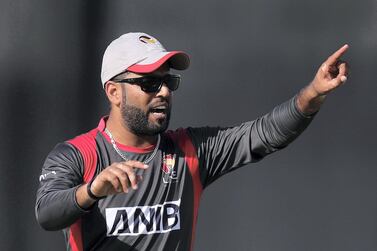The corruption malaise in UAE cricket resurfaced on Sunday as the ICC formally charged Amir Hayat and Ashfaq Ahmed with breaching the sport’s anti-corruption code.
The national team duo were each charged with five counts of breaking anti-corruption rules.
They have been provisionally suspended with immediate effect by the game’s governing body.
However, both have already been absent from the national team for some time due to the ICC’s investigation.
Ashfaq, the opening batsman, was thrown out of the UAE squad after playing the first two matches at the T20 World Cup Qualifier last October. He was suspended indefinitely by the Emirates Cricket Board.
Hayat, the fast bowler, had been overlooked for selection for that competition. It is believed his omission was related to this investigation.
The duo face the same charges. They involve “seeking, accepting, offering or agreeing to accept any bribe or other reward” to “influence improperly” aspects of international matches.
That includes ensuring “for betting or other corrupt purposes the occurrence of a particular incident in matches”.
The charges also refer to “failing to disclose” receiving gifts, payment, hospitality or other benefits that were given “to procure [directly or indirectly] any breach” of cricket’s anti-corruption code.
They also refer to "failing to disclose to the anti-corruption unit [without unnecessary delay] full details of any approaches or invitations … to engage in corrupt conduct".
Lastly, they were charged with “failing to disclose to the ACU full details of any facts or matters that came to [their] attention that may evidence corrupt conduct under the code by another participant.”
Hayat and Ashfaq each have 14 days from Sunday to respond to the charges.
It takes the number of UAE players who are now banned from the sport pending the corruption investigation to five.
On the eve of the qualifier last year, Mohammed Naveed, the captain, batsman Shaiman Anwar and fast bowler Qadeer Ahmed were all charged by the ICC with a variety of breaches of the code.
They were all removed from the squad for that tournament, and have not played again since.
After 11 months, each is awaiting judgement. All have returned to their native Pakistan.
Naveed has hired a Dubai-based lawyer to fight his case, and in June he said: “God gave me everything. I accept my mistake in not reporting [a corrupt approach].”
Shaiman has only commented publicly on his case once, writing on Twitter in April: “From Sialkot to UAE [I] played fair cricket.
"I just played my game with passion honesty and for my country UAE.”
Qadeer, who is also awaiting judgement, now runs a shop selling milk in Rawalpindi.
A sixth player, wicket keeper Ghulam Shabber, is also suspended from cricket by the ECB for leaving the country without permission during the Qualifier last year.
He has not been mentioned by the ICC in relation to the anti-corruption investigation.







